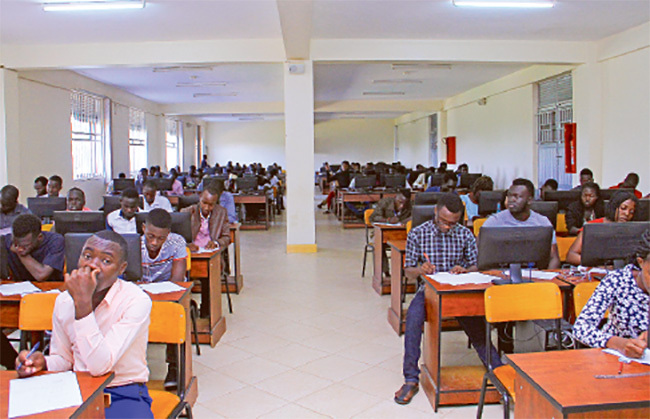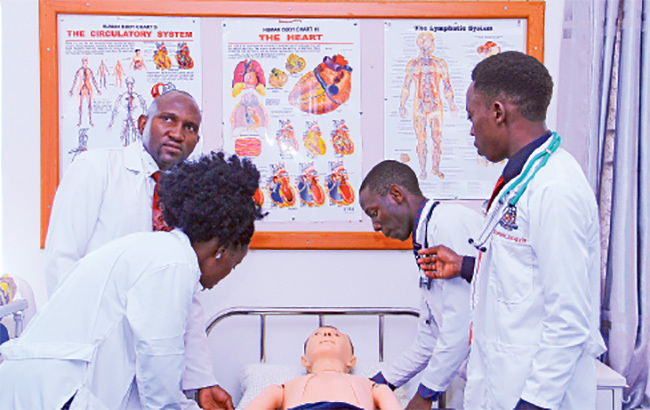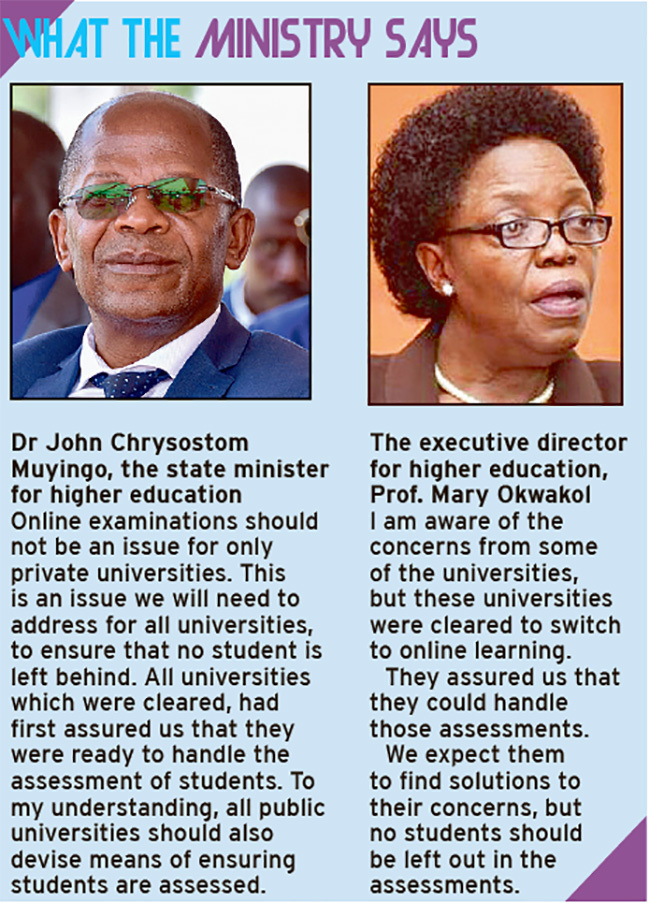Coronavirus: Are universities ready for online examinations?
COVID-19 |
All universities and schools were closed in March and, seven months later, they have been re-opened for candidates and finalists.
The Government has allowed universities to offer online lectures and 50% of the 51 universities, according to the National Council for Higher Education (NCHE), have made the switch.
Unlike schools, where a few of them are offering online lessons, the universities' are expected by the Government, to lecture and assess students online during the COVID-19 era.
This technology-driven students' lecturing, during lockdown, might work for most universities in Uganda.
However, how can it support online examinations? Is it realistic? Is it possible to prevent cheating of examinations by invigilating students virtually?
The online examination system is a digital platform that relays exams to students, which are later marked and scored by lecturers.
In certain cases, the system scores the students. In this case, students, from wherever they are, are expected to write their examinations on their laptops, with software-controlled applications.
Eventually, with online lecturing becoming the new normal in Uganda's universities, protecting the integrity of exam and exam data are becoming key areas of concern too. Experts and educationists say there is a way out.
Five private universities of the 25 universities cleared to conduct online lectures, already have online assessment systems.
However, most public universities say online assessments are expensive, adding that their students do not have the required gadgets such as laptops to effectively carry out the examinations.
Officials from public universities, whom New Vision talked to, plan to opt-out at the end of semester examinations and only hope the COVID-19 pandemic can end soon.

Private universities take
Some private universities have embraced online examinations. These include ISBAT University, Ndejje University, International University of East Africa, Victoria University and Clarke International University.
Thomas Denish, the head of Quality Assurance at ISBAT university, says it is possible to do online examinations; if you have the right software.
"It is not just a matter of sharing the question paper online through email or WhatsApp. You need security features, to ensure that there is no cheating of the examinations. The integrity of examinations is important," he says.
Denish explains that to have integrity of examinations, and to ensure all students are doing the examinations, it calls for planning.
Denish advises that it is important that every university, checks the readiness of its students, before subjecting them to online examinations. He says that before such a system is implemented, it is important to ensure that all students have the gadgets they require, like laptops with webcams and Internet access.
"The laptops should also have software installed to stop exam malpractices," he adds.
He explains that in their survey at ISBAT, 10% of the students had an issue of lack of laptops and the Internet, which meant that a solution had to be sought for them.
"We decided to get Internet paid by the university. Wherever students are going to do examinations, we put them on portals, where we have pre-paid Internet for them. However, they must get the laptops themselves," he says.
"A good online system requires appropriate user authentication. Each user is given a unique username and a password (both encrypted) as defined by the system administrator or the higher authorities as authorised by the university," Denish explains.
He adds that registered students, "have rights granted by the system administrator to access course materials and attend specific internal assessments and semester-end exams. Registered instructors can add and update class notes, upload assignment questions, and prepare the students for exams," he adds.
The dean of the faculty of Information and Communications Technology at ISBAT, Dr Sambasivan Gnanasekaran, says universities with online examinations need to embrace the exam cell system.
"It can set the exam criteria, such as duration, scheduling of exams, set question patterns, and deposit the university's question bank with appropriate access rights. An appropriate digital evaluation system (DES) is made available for certain sections of the exams and supplemented by descriptive evaluation by authorised assessors."
He explains that a good system of examinations monitoring requires at least three layers of protection of the examination.
The credible online examination system should have a Student Portal Login (Layer I), Student Verification (Layer II), and a Lockdown Browser (Layer III).
Denish also explains that the student can log in through the students portal; which activates and controls the web camera on the students' system.
"Each student has his or her own log-in credentials to access the user-level system, which provides user-level security and prevents unauthorised access," he explains.
Regarding the second layer, the exam system verifies the student identity against the photo stored in the university's database (ERP). The system uses the "Amazon Rekognition" plug-in, a cloud-based computer vision platform that is popularly used for face recognition. Rekognition provides several computer vision capabilities, which are developed and applied seamlessly to ensure error-free verification of images against the computer-stored data image.
"On the third level, which is the lockdown browser, in which the exam is opened by the student," he says.
"After a successful student verification, the system launches scheduled examination under lockdown browser (Safe Exam Browser - SEB), which freezes the system from accessing any other applications including LMS, Google Bing, YouTube," he adds.
Denish explains that as a student does the examination, he is monitored by a camera, which audits their and eyes movements every after 10 minutes.

"Unnecessary movements of the body off the laptop or off the computer screen can lead to disqualification of a student doing an exam," he explains.
"Once the exam is completed and submitted, the student will be able to attach necessary drawings, calculations steps as supporting his or her answer within the specified time limit. Such attachments
are mandatory for certain objective questions, while certain questions are descriptive," Denish adds.
Exams have to be done in a specific browser.
Dr Gnanasekaran explains that Safe Exam Browser (SEB) opens a web browser window without navigation elements all the standard keyboard combinations that usually invokes various tasks and it directs students only through the exam-enabled mouse functions.
We have extensive audit trailing functionality to find any malpractices during the ODeL examination time. System records snapshots from a student's computer with a frequent time interval and the images are stored on our cloud server.
In this case, the Gnanasekaran says examiner can adjust the time interval for audit trailing as per the advice from the university's exam management committee.
"These audit trails are scrutinised by the exam committee, to avoid malpractices. Any such cases of malpractice found are dealt with by the committee for further necessary action," he explains. He says that this system is benchmarked on the Indian universities.
The vice-chancellor of the International University of East Africa Dr Emeka Akaezuwa concurs with Denish and adds: "There are many online assessment tools which universities can build for higher education, some free and others subscription-based."
He also notes that it requires the use of good models to ensure that the different learning levels are tested and tested according to best practice.
At Victoria University, the deputy vice-chancellor, Dr Lawrence Muganga, says the university has embraced open book examinations. "We also do project work and students are expected to later on defend their work in face-to-face sessions later. This would be used to replace the normal examinations we were doing."
Alice Murungi, a student at Victoria University, says: "This is a better way of being examined. In universities, we should be scored on what we understand, instead of just recalling in an examination room; as it was in the past."
Impossible move for public universities
Several public universities have not yet embraced the examination of their students, in summative (end of the semester) examinations, based on a survey done by New Vision.
Much as they are determined to do a continuous assessment of students through courseworks and assignments, they argue that the prohibitive cost of setting up the online assessment system for end of semester (summative assessments), might hold them back. They also argue that they have a big number of students who cannot easily be assessed using such online systems, unless they are ready to massively invest in modern systems. More so, they argue most of their students do not have laptops and may struggle, getting the required Internet access.
The officials of these universities that New Vision talked to, say, they are not set to handle end of semester summative tests, since they have no online systems set.
Makerere University, which has the highest number of students in the country as per the National Council for Higher Education records, says it may not easily assess students online.
Makerere's director of quality assurance, Dr Vincent A. Ssembatya says: "Such online assessment systems are not easy to install for a big number of students due to costs, but also the concerns about the integrity of examinations."
He explains: "When you have a massive number if students, like the ones we have. It also requires massive investment to be able to build such systems and considering the time we have, we may not assess students online."
Asked whether this means that they will only lecture, but not do the final examinations for all the continuing and new students, he said: "We will not assess students online.
If COVID-19 does not go down or we have no ways of allowing all students back, we will lecture, but cannot do the final or end of semester examinations on an online system."
"This will require us to have a massive investment, which we are not prepared for now. There must also be a gradual acceptance of the system by the users if it is to succeed. All this cannot be done as of now," he notes.
However, Ssembatya noted that continuous assessment, like the coursework can be done online, but not the end of semester examinations, which take the largest share of the scores in the assessment of learners. He hopes that by then, universities will be allowed to re-open, or examinations will be postponed.
At Busitema University, the in-charge of online learning, Leonard Wamakote, says apart from continuous tests and assignments are given during lecturing. "The university cannot as of now get into the investment into an online assessment system for students," he says.
He adds: "Even if the university secured the online assessment system, it would be a challenge for most students who do not own laptops. They need gadgets with cameras, to be able to secure software, like that being used in some other privateuniversities."

Cost of effective online system
Makerere's director of quality assurance, Dr Vincent Ssembatya, says it is costly to have effective online systems.
He says universities like Makerere might end up spending about $20m (about sh74b) to set up such a system.
He says Makerere has about 4,000 course units and each of these course units must have their applications.
He says effective applications, when fully set up, cost around $5,000. This comes to $20m.
"As a university in a developing country, we have to use the blended (physical and online) lecturing and assessment, as of now," he explains.